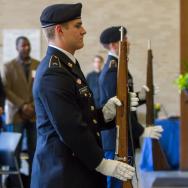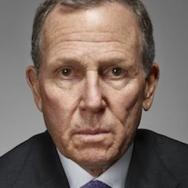From a former Green Beret planning to study economics to a Navy linguist interested in human development, a diverse group of students will join the University of Chicago community this fall through a new program created to support and engage undergraduate veterans.
The University is welcoming 14 students from four branches of the U.S. military as part of the UChicago Veteran Scholars program, an initiative that provides holistic services including academic and career counseling.
To ensure undergraduate veterans thrive during their time at UChicago, the undergraduate College has launched a new Office of Veterans Services, which will work closely with College Admissions and Financial Aid to support veteran enrollment initiatives and engage veterans in the broader life of the College. A dedicated adviser with military experience from the office will serve as a mentor and will provide specialized career and academic advising and programming to undergraduate veterans.
“The Veteran Scholars program continues our commitment to ensuring students from all backgrounds find a home at UChicago,” said James G. Nondorf, vice president and dean of admissions at the University of Chicago. “We are honored to welcome a group of veterans whose diverse voices, viewpoints and experiences will enrich our classrooms and the UChicago community as a whole.”
The program is part of a larger effort to recruit and enroll veterans and provide support to UChicago’s military community. In 2018 the University created the Office for Military-Affiliated Communities, a central resource for prospective and current students, faculty and staff who serve in the military, are veterans or are members of military families. Through a partnership with the nonprofit Posse Foundation, many of the Veterans Scholars will receive training prior to arriving at UChicago and mentoring while enrolled in the undergraduate College.
The inaugural class of UChicago Veteran Scholars is made up of four veterans from the Army, five from the Navy, four from the Marine Corps, and one from the Air Force. Below are some of their stories.
Alexander Kilbourne, Army
Alexander Kilbourne began working full-time while enrolled in college in order to contribute to his family’s household. Unable to balance full-time work with academic requirements, Kilbourne withdrew from college and enlisted in the Army.
Kilbourne became a Green Beret after completing an intense, three-year training program, and completed deployments to Afghanistan, Hungary and Romania. In 2014, Kilbourne returned to the United States and was selected for a highly classified assignment in special operations that focused on conducting sensitive missions in politically delicate or austere environments.
After 10 years in the Army, Kilbourne left the military to complete his undergraduate education—a goal that had always remained in the back of his mind.
“Even though I encountered some challenging situations while in the military, nothing I’ve faced seemed like more of an uphill battle than putting my feet back into the waters of applying as an undergrad,” he joked.
At UChicago, Kilbourne hopes to study economics—a deep interest he first developed during a deployment to northwest Africa, where diplomatic officials were concerned about the effects his missions would have on local economies.
He is especially looking forward to participating in UChicago’s environment of rigorous inquiry.
“In the military, you have a lot of people not just telling you what to do, but how to do it,” Kilbourne said. “What I really like about UChicago’s academic environment is that inquiry doesn’t stop at ‘I’ve given you this problem, solve it my way.’ It actually opens the field up to ‘Here’s a number of ways you can tackle it, I want to see what your creativity and your intellectual rigor produces.’”
Kaedy Puckett, Navy
Kaedy Puckett entered college after high school but eventually withdrew after it became too much to manage. She decided to join the Navy as a way to redirect her life.
After taking the job placement test, Puckett chose to study linguistics and graduated second in her class from a 64-week intense course in Arabic at the Defense Language Institute. She completed three tours of duty in the Mediterranean and in Afghanistan as an airborne cryptologic technician Arabic linguist and also served as a Navy military training instructor.
She later participated in the Warrior-Scholar Project, a weeklong academic boot camp for veterans, which renewed her interest in higher education.
“It re-instilled a bit of scholastic confidence in me, and I realized the only thing holding me back from academic pursuit or achievement was myself,” Puckett said.
At UChicago, Puckett is interested in studying comparative human development—a subject she became interested in after realizing how much her ideologies, priorities and passions evolved as a result of her experiences in the military.
She is excited to get involved with the campus community and hopes to change the stereotype of veterans.
“I’m excited to open up some dialogue with my classmates and show them that we are not the military campaigns that we fought in,” Puckett said. “The word ‘veteran’ does not necessarily define who we are as people. It’s part of a complex whole person made up of all these different experiences.”
Jason Guba, Marine Corps
After his father became sick with cancer, Jason Guba enlisted in the Marine Corps so he could help take the financial burden off his family.
Fascinated by STEM subjects, Guba excelled working with technology in the Marines, where he advanced to a sergeant in tactical communications, repairing ground electronic equipment and supervising, mentoring and training a team of 38 Marines.
After participating in the Warrior-Scholar project, Guba found out about UChicago’s program through the Posse Foundation.
“As I started doing more research regarding the classroom sizes and discussion-based lectures, I realized it fit into the kind of college setting I wanted to be in,” Guba said. “I wanted to be where students are encouraged to discuss certain topics that not everyone may feel comfortable with because that’s helpful in expanding our own points of view. That resonated with me because in the Marine Corps you can’t let emotions compromise your decision-making skills.”
Guba hopes to study computer science and ultimately go into cybersecurity, with the goal of serving in either the uniformed Armed Forces or the Department of Defense.
He looks forward to connecting with fellow veterans in his program, a resource he believes helps the transition to the civilian sector.
“The Veteran Scholars program brings together veterans from different backgrounds, branches and job occupations and instantly provides us a network of people who believe veterans can succeed at elite institutions such as the University of Chicago,” Guba said.

